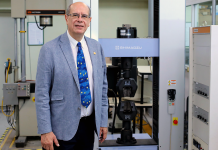The Third International Conference on Quenching and Distortion Engineering (QDE2025) will be in Vancouver, Canada, May 5-8, 2025. The event brings together practitioners, engineers, and researchers from academia, government, and industry to explore the forefront of distortion control and quenching techniques.
QDE 2025 offers a platform to share cutting-edge research, innovative solutions, and real-world case studies in quenching and distortion control across industries such as automotive, aerospace, manufacturing, and electronics.
Conference highlights include:
Cutting-edge research: Engage in dynamic sessions featuring presentations by global experts, unveiling the latest innovations and case studies in quenching and distortion control.
Real-world impact: Discover practical applications and impactful case studies showcasing advancements in quenching and distortion control across industries.
Explore the exhibit hall: Visit the co-located exhibition showcasing state-
of-the-art equipment, technologies, and products in the quenching and distortion
control domain.
Connect and collaborate: Network with professionals, forge partnerships, and exchange ideas, fostering future advancements in the field during this ideal platform for collaboration.
The call for papers is now open. The submission deadline is September 5, 2024. Paper topics include:
- Fundamental principles of quenching and distortion.
- Control and elimination of distortion (quench media control, in-process measurement tools, quality management, interactions of different production processes).
- Agitation measurement and control (including quench media characterization, monitoring, servicing, and facilities).
- Material and shape optimization for distortion control.
- Equipment design and fixturing.
- Case studies on distortion problems.
- Boundary conditions and heat transfer as applied to distortion control (NOTE: these are combined).
- Modeling of processes and phenomena (including phase field, MD, and other modeling approaches).
- Computational fluid dynamics (including modeling of quench media and heat transfer for both development and in-process applications).
- Finite element analysis and constitutive equations (for distortion during quenching, casting, hot and cold forming, soft and hard machining, and heat treatment).
- Measurement of residual stresses.
- Prediction and control of residual stresses in additive manufactured parts.
MORE INFO www.asminternational.org/qde2025























